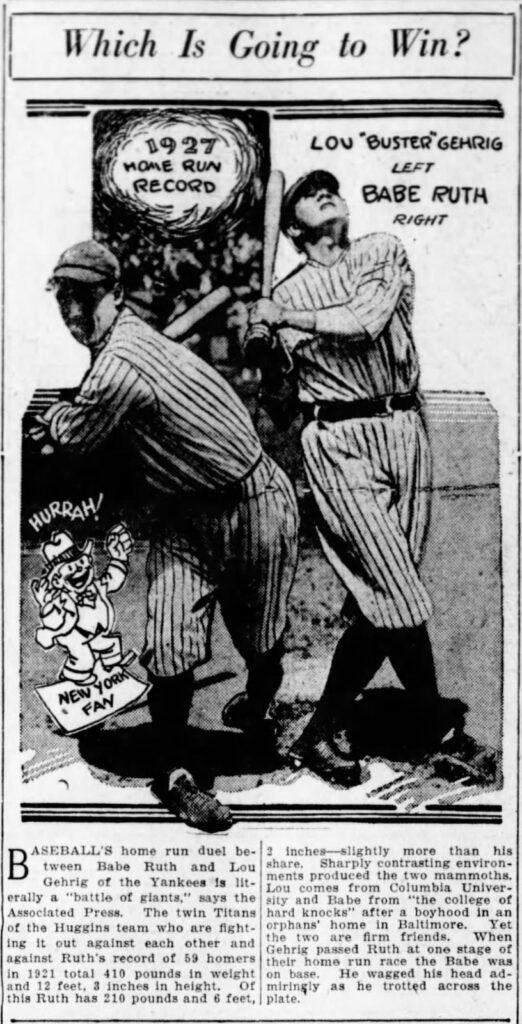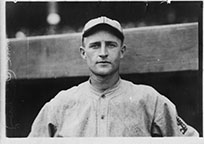Spit Ball Veteran Has Applied His Brains to Game in Practical Way
July 7, 1927 Age: 36
By THOMAS HOLMES. The Brooklyn Daily Eagle
Angular and scrawny of build, thin-featured and serious of expression, William Leopold Doak would fit the most critical movie director’s idea of a church deacon. But William Leopold is far more entertaining than that might sound to some.
For instance, Doak has a keen and unusual sense of humor. He can coax some lively melody from a battered, old harmonica that invariably reposes in one of his inside pockets. He can pick ’em up and lay ‘em down with any of the kids on the Brooklyn hall club and throw in a few Charleston steps, for good measure.
And, incidentally, he can step out there and pitch a mighty fine game of ball for a 37-year-old veteran who was athletically inactive between the ages of 34 and 38.
Bill Doak’s comeback has been one of the most remarkable incidents of the present season. There was a time, and it was not so far back, when Bill was just about the best pitcher in the National League. Being with the St. Louis club throughout an era in which St. Louis was always next to nowhere in the standings, Bill seldom received the credit that was coming to him.
Traded to Brooklyn in the summer of 1924, Doak proceeded to have one of his greatest years. But the following spring Bill held out and finally voluntarily retired. The Florida “boom” was under way and Bill was in on the ground floor.
Doak’s Comeback A Big Success.
Barring only an occasional line from Bradenton down in the realty belt, little of the veteran spit-ball pitcher was heard until last winter, when he applied for reinstatement.
The bottom had fallen out of the Florida boom – even the ground floor. “Not so good,” said William Leopold. And he began to make preparations for a comeback that few veterans would have the nerve to try and a comeback that has perhaps never been previously attained in modern history.
Today, Bill Doak leads the powerful Brooklyn pitching staff in the percentage column. He has won eight games and lost four for a club that languishes in the throes of the second division. He has everybody shaking his or her head and wondering how he does it.
Control of the spitball, that fast vanishing delivery that will be utterly extinct within a few short years, is the answer. Most spitball pitchers and some good spitball pitchers cannot control their pet delivery. Bill has remarkable control of his “wet one” – can use it in any old pinch. Further than that, he carries into action his old courage and his pitching “know-how.” A great man William Leopold Doak.
Bill Takes Even His Hitting Seriously.
FROM THE SECOND paragraph of this one must not gather the impression that Bill Doak takes his baseball lightly. That would be all wrong, for Bill is one of baseball’s little group of serious thinkers.
Doak is a hustling pitcher. As you know, most pitchers aren’t good hitters. Some of them- great many of them, in fact – try to laugh their hitting inability off. Bill Doak isn’t a good hitting pitcher, but you seldom see him take a half-hearted stab at the ball. He has been working to improve his hitting ability ever since he has played baseball, realizing that any improvement, however slight, might sometime help to win a game.
A naturally poor hitter can learn to bunt and Bill is a better bunter than many athletes who can double his batting average. Bill developed that art and we bet that nine out of ten pitchers never in their lives devoted any serious time to learning how to bunt.
Doak’s Fielding Has Won Ball Games.
THE MAJORITY of pitchers think that all they have to do is to get out there and heave that ball. A pitcher seldom practices fielding his position. Doak is an exception, and it would be interesting to know just how many games Bill has won because he is a good fielding pitcher. They mount up over a stretch of years.
Start a bunting game anywhere around Ebbets Field any afternoon before batting and fielding practice for the regulars and Bill is a cinch to drift over and into it. Every fan is familiar with those “clowning” performances in what the players call “pepper” games. Doak is clever at his “sleight-of-hand” stuff. But so far as Bill is concerned, a “pepper” game is something more than passing amusement. It helps him in his fielding and his fielding helps him win ball games.
Bill’s Glove Popular Among Big Leaguers.
BILL’S attention to his personal game years ago resulted in a venture that has proved a money-maker to him and some extreme satisfaction to a lot of other ball players. He patented and placed upon the market the “Bill Doak” glove, which, it is said, is used by more big league ball players than any other brand.
Bill’s glove is equipped with a “web” of a double strip of rawhide lace between the thumb and first finger, instead of the old-fashioned single strip of leather. The thumb of a Bill Doak glove is enlarged to bring it up even with the first finger, thus forming a larger pocket, but that rawhide web is the secret of the glove’s popularity among ball players.
That’s another indication that Doak doesn’t use his baseball brains for the sole purpose of throwing a baffling spitter.
Too bad Bill Doak didn’t get to face Ruth, except once in spring training. It would have been an interesting matchup in Bill’s prime.

